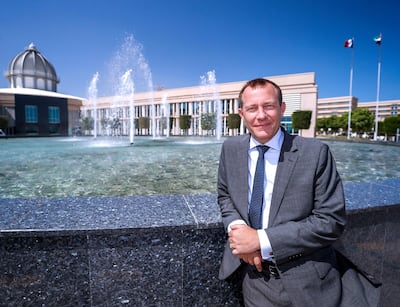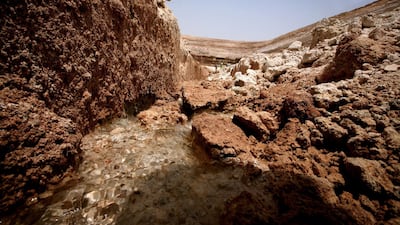The Gulf is about to run dry. And right now, Abu Dhabi is on track to run out of fresh water in less than 50 years.
A common water law in the Gulf will be the first step to water security, say academics at the Paris Sorbonne University-Abu Dhabi. They are developing a roadmap for a legal framework to define a single legal status for water in GCC countries. This will establish legal obligation by the authorities and encourage private companies to adopt effective water management practices.
“I was struck by the fact that there was a great concern that the public stakeholders were very aware of the stakes regarding freshwater and there was a strong need to develop a full system which would be efficient and equitable,” said Dr Anthony Chamboredon, an associated professor of law who specialises in sustainable development law.
Central to this roadmap is a book edited by Dr Chamboredon on water law, the culmination of four years of research and collaboration between the university, government researchers and ministers, and the private sector. Dr Chamboredon hopes that Fresh Water: Law and Stakes in the Arab States of the Gulf Cooperation Council will be one of a series.
Published in December, it examines how the dwindling aquifers beneath Abu Dhabi's dunes can be preserved and how streamlined laws and policies will secure fresh water for future generations.
_____________
Read More:
Water shortages now a 'huge concern' for UAE, says Energy Minister
Explained: 10 ways to cut your water consumption
FNC discusses increased protection for UAE farmers from cheaper imports
_____________
The numbers are stark. The population of the Arab region is expected to reach 598 million by 2050 and as Gulf countries become more affluent, the per capita consumption of water increases. Water consumption in Abu Dhabi is rising at an annual rate of 9.5 per cent and demand has more than doubled in the last decade.
Oases that sustained a small, semi-nomadic population of 70,000 until have almost dried up.
Ancient aquifers, which hold water that is 12,000 to 40,000 years old, have been emptied in a few generations. They are essentially a non-renewable resource. Abu Dhabi gets an average of 82 mm of rainfall per year and water evaporates at an annual rate of 2,000 to 3,000mm.

The ground water that supplied 80 per cent of the emirate's water ten years ago is nearly gone.
Instead, the country has looked to energy-intensive desalination to meet our most basic need. It provides nearly all of the water in the UAE’s distribution system used for human consumption.
Arab Gulf states make up at least 60 per cent of the world’s desalination capacity. Globally, the UAE is second only to Saudi Arabia for desalination. Desalination in Abu Dhabi quadrupled between 1985 and 2000 to more than 400 mm3 per year and is expected to triple again in the next 12 years.
This comes at a great environmental and economic cost.
Essential commodity
“In short, a paradigm shift is needed from water being viewed as a common, readily available, free resource, to it being a rare, expensive, precious and essential commodity,” writes Razan Al Mubarak, the secretary general of the Environment Agency – Abu Dhabi, in the book’s foreword.
Business as usual is not a satisfactory response, she says. “A whole new approach is required.”
Researchers at the Sorbonne in Abu Dhabi have looked at existing water laws, policies and enforcement to decipher a solution.
First, they have found stricter enforcement of existing water laws is needed.
Ayesha Al Suwaidi and Imene Fattoum, masters students in sustainable development law, detailed some of the 80 court cases on illegal groundwater trade in Abu Dhabi. Their findings show maximum penalties are seldom enforced. Instead, illegal water traders are usually fined between Dh5,000 to Dh15,000. They do not cite any instance where traders faced jail.
“This case law illustrates that, despite the [Environment Agency]’s efforts, farm owners are still illegally selling and transporting groundwater either because people are unaware of the seriousness of the problem, or turn a blind eye due to the penalties often being less than the possible profits,” they write.
Fines but little punishment
The Environment Agency is working with the Judicial Department of Abu Dhabi to education judges but the emirate is still at a stage of assessment and proposals.
“There is hesitance when it comes to strictly policing the water sector,” writes Dr Faraj Ahnish, a managing partner at the Abu Dhabi law firm Hadef &Partners. “One of the reasons for this, historically, is that groundwater wells are constructed on private farms, with a belief among farmers that groundwater belongs to them.”
Of Abu Dhabi's 72,000 active wells, there have been just four cases have of drilling without a valid licence. Furthermore, writes Dr Ahnish, “Not only is the existing punishment lenient, but no specific provisions prohibit certain acts, with the exception of not having a license."
He notes that violators were not imprisoned, despite laws stating violators face a minimum imprisonment of three months. Instead, most received the minimum a fine of Dh10,000. Under existing laws, fines are punishable up to Dh20,000. “However, when incomes from selling groundwater are more profitable than this, the penalties often do not serve as a deterrent,” warns Dr Ahnish.
Secondly, researchers have looked at the best practice for water tariffs. Low water and electricity fees have contributed to a sense of water resource abundance, writes Dr Chamboredon.
Deteriorated
This is particularly true in agriculture, which has pushed reservoirs to their limits. Many of Abu Dhabi’s 25,000 farms are in inland oasis. Agriculture and forestry make up 76 per cent of the water consumption in Abu Dhabi.
Add landscaping and roadside plantations to the equation, and Abu Dhabi’s greenery accounts for 85 per cent of the emirate’s water. Almost all of Abu Dhabi’s natural groundwater use is pumped into agriculture.
When farmers began planting, there were ample aquifers. Wells have proliferated in the last two decades, from 5,667 to 72,000 active wells. At that same time, unproductive wells have increased from 10 to 25 per cent, a clear indicator of aquifer depletion. Remaining groundwater has deteriorated and become saline.
Mohamed Dawoud, a water resources adviser at the Environment Agency, singles out sizeable agricultural subsidies that “do not encourage rational water use”, hamper water security and make negligible contributions to GDP`.
The current low tariffs do not match supply costs or the environmental cost. Yet financial disincentives may be ineffective. In developed countries, consumption is tied to household size, not financial constraints. How do tariffs work in a country where revenue per capita is so high for parts of the population and with great income disparity?
Kosmas Pavlopoulos, a professor at the university’s Geography and Planning Department, proposes one solution to the aquifer dilemma. He suggests the establishment of a local bureau that pumps treated waste water into defunct aquifers for agricultural use. Less than 10 per cent of Abu Dhabi’s water supply comes from waste water.
He has already begun collaboration with the government and outlined how it could be implemented in the next two to five years in places like Madinat Zayed.
“We must be starting,” he said.
“The government is on the right path. I think it must speed up a little bit because water is as precious as the oil and the natural gas fields now. Energy and water are the main tools for the 21st and 22nd century.”
Finally, the Sorbonne's researchers warn that bureaucratic fragmentation remains a barrier to water security.
Still time to act
“In many GCC countries, responsibility for the administration, regulation, and development of water supplies is fragmented between many government entities, with Saudi Arabia and Oman the main exceptions,” writes Dr Dawoud.
“This frequently results in conflicting policies, political competition between agencies, and the lack of a comprehensive and coordinated policy for the allocation, management and use of water supplies."
This is improving. A new 2018 law that merged the two main entities in charge of the water and energy regulations for Abu Dhabi, the Abu Dhabi water and energy authority and the Abu Dhabi regulation and supervision bureau. On a regional level, unified water strategy drafted by the GCC secretary general was published in March 2017.
It cannot happen soon enough, notes Al Mubarak. “Currently, there is time to manage and avoid the worst impacts of these longer-term trends, but this needs to start now.”

